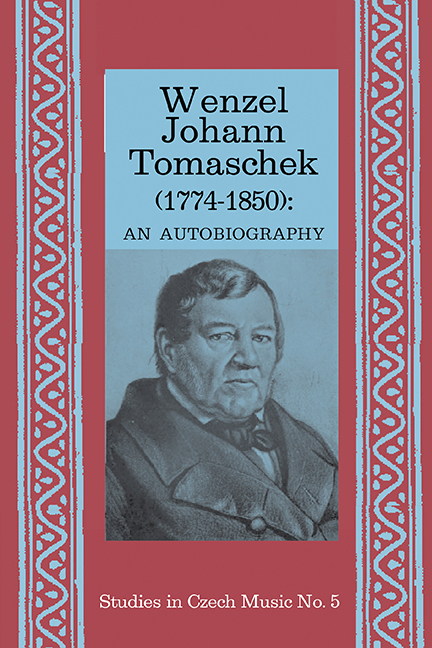Book contents
Introduction
Summary
Johann Wenzel Tomaschek/Jan Václav Tomášek (1774-1850) was one of the most significant and fascinating musical personalities at the beginning of the 19th century. A brilliant pianist, teacher, composer and critic, he was known as the Musical Pope of Prague. Tomášek was a friend of Beethoven and Goethe, and taught such figures as the virtuosos Alexander Dreyschock and Jan Václav Voříšek and the critic Eduard Hanslick. Despite the fact that he composed over one hundred compositions, including operas, concerti, string quartets, symphonies, songs and religious works, he is known today almost exclusively for his characteristic piano pieces, variously titled Rhapsodies, Dithyrambs, and most often Eclogues. Though these titles all have their roots in classical poetry, the pieces in question combine aspects of classic style with fresh, new and even idiosyncratic takes on contemporary musical thought.
This Autobiography first appeared in installments between 1845 and 1850 in the periodical Libussa. An annotated Czech translation appeared in 1941 and excerpts have appeared in English in The Musical Quarterly in 1946 and The Musical Times in 1974. This volume is the first complete English translation of the work.
While it provides a good deal of information about the composer and his life it also offers something much rarer: a sense of historical texture and depth. A prickly figure, simultaneously confident and utterly insecure, Tomášek's writings about the great and near great, as well as his recollections of dozens of characteristic goings on, give us a rare kind of insight into both the man and his age. In the words of Kenneth Delong, “Highly opinionated, often sarcastic and projecting a sense of his own importance, Tomášek's memoirs also reveal him to be deeply concerned about all things artistic and intellectual: a man of courage and idealism, unflinching in his pursuit of truth in music and in life.”
Tomášek offers many different kinds of writing and observation: there are snapshot concert reviews; chatty gossip about celebrities, especially royalty; detailed comments about important figures such as Beethoven and Goethe. There are passages that show Tomášek's close engagement with contemporary art and science, whether paintings, architecture, gardens, or new technologies; we also find personal aphorisms about life, broadly speaking, and of course comments about his own work.
- Type
- Chapter
- Information
- Wenzel Johann Tomaschek (1774–1850)Autobiography, pp. x - xviPublisher: Boydell & BrewerPrint publication year: 2017



